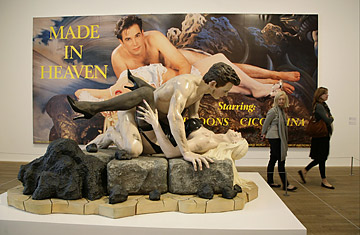
Visitors look at works by Jeff Koons at the controversial show "Pop Life" at Tate Modern in London
At London's Tate Modern art gallery, a spotlight shines on a blank space where a photograph of a nude Brooke Shields, age 10, was supposed to hang. A sign warns, "This room contains images that some visitors may find challenging." The museum removed the image this week just before a new exhibition on Pop art opened. The reason: an unexpected visit by police to check out the controversial image. The photograph, which shows the young Shields standing in a bathtub and wearing heavy makeup, was displayed recently in New York City and Paris without contest, but the prestigious modern-art museum in London has taken it down while police investigate whether it breaches British obscenity laws. "The officers have specialist experience in this field and are keen to work with gallery management to ensure that they do not inadvertently break the law or cause any offense to their visitors," London's Metropolitan police said in a statement.
The show, titled "Pop Life," includes lots of explicitly sexual images, including large-scale photographs of Jeff Koons having sex with his ex-wife Cicciolina, a porn star turned Italian politician. But it was the decision to display the Shields photograph, which the museum had set up in its own room, that drew the most attention from British press before the show opened. It certainly offended Michele Elliott, founder of Kidscape, which campaigns against child abuse in the U.K. "What I see is an indecent photograph of a child being used to bring people into an exhibition," says Elliott, who filed a complaint with London police after reading previews of the show. "Child pornography masquerading as art is sick. If we found this image on someone's computer, they would be investigated."
British media-law expert Razi Mireskandari, whose firm Simon Muirhead & Burton has successfully defended the publication of sexually explicit photographs by Robert Mapplethorpe in the U.K., says Tate Modern would be unlikely to lose an obscenity case. The U.K.'s Obscene Publications Act defines as "obscene material" anything that would "tend to deprave and corrupt" the public. "That doesn't mean just 'upset or put off,' " says Mireskandari. But, he notes, the U.K.'s Protection of Children Act might come into play. "The key tests would be whether the child is posed provocatively, whether there was an element of lewdness or erotic detail to distinguish it for example from ordinary family snapshots."
The photograph of Shields, taken in 1975 with the consent of Shields' mother, is by New York–based photographer Garry Gross. Gross told the Daily Telegraph he was disappointed that the photo was taken down and did not consider it pornographic, though "she was supposed to look like a sexy woman." The image removed from the Tate is actually a photo of that photo: in 1983, artist Richard Prince took a photograph of Gross's original photo, framed it, and titled it Spiritual America. And though it hasn't been censored before, it's not the first time it has stirred controversy. As an adult, Shield went to court to try to block further use of the photo but lost. It has since been reprinted around the world and is widely available on the Internet.
British authorities seem to be increasingly cautious when it comes to photographs of kids. Two years ago, police seized a photograph by Nan Goldin of two young girls belly dancing in the nude. The work, which six years earlier had been judged decent by the Crown Prosecution Service, was part of a set owned by Elton John and was on display in a northeastern England gallery. The CPS once again cleared the image, saying that standards of propriety had not changed significantly since its last judgment.
U.K. laws on photographing children in public have become tougher in recent years too. This has led to controversies over where to draw the line. In July, a grandmother was reportedly prevented from taking pictures of her granddaughters at a public swimming pool as one of them showed off their diving. "I like to think it would have been obvious that I was their grandmother," 85-year-old Sheila Campbell told the Daily Telegraph at the time. "There were no other children anywhere near her, but anyway, I was only interested in taking photos of my grandchildren."
